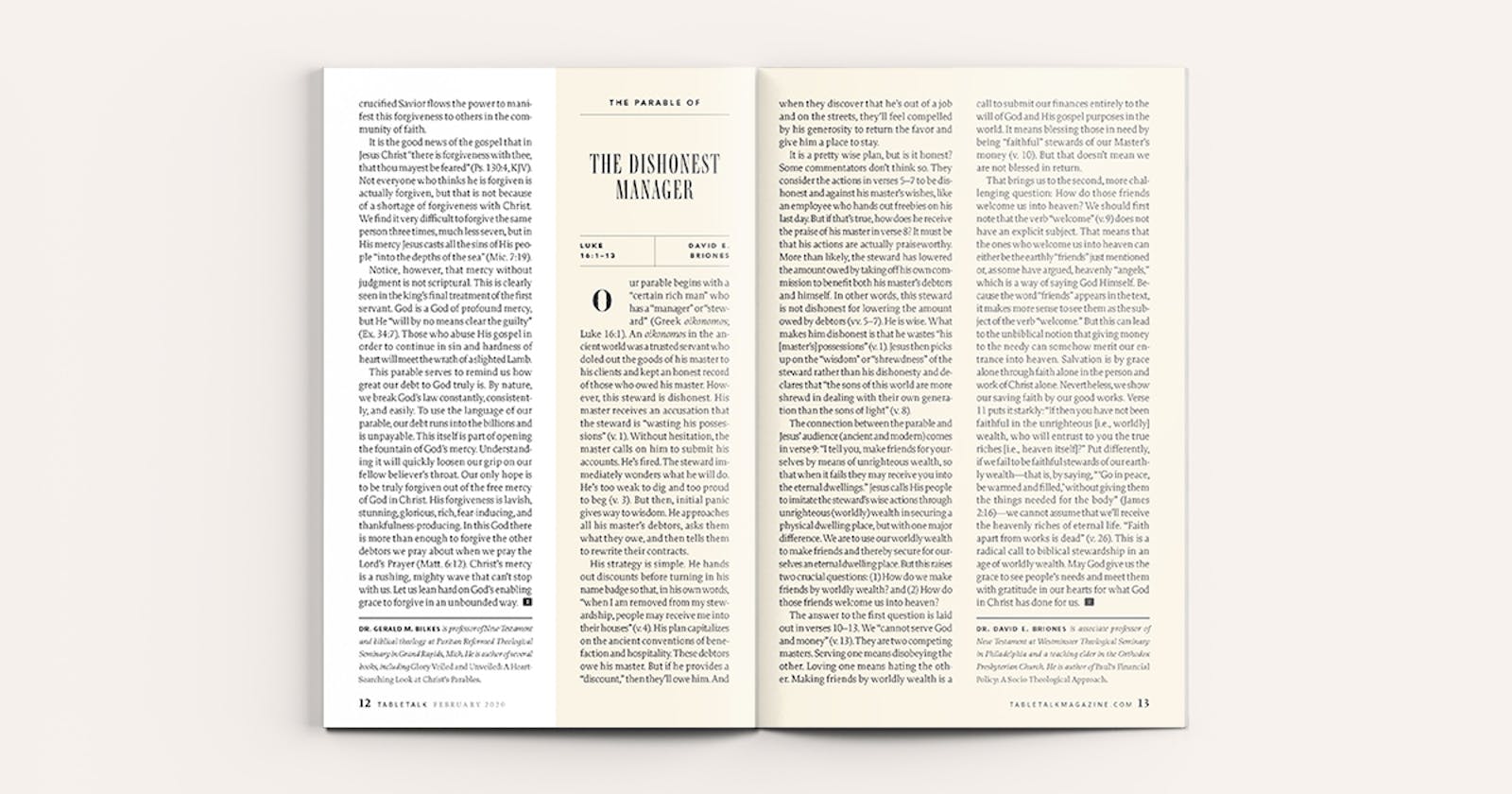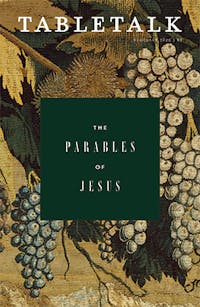
Request your free, three-month trial to Tabletalk magazine. You’ll receive the print issue monthly and gain immediate digital access to decades of archives. This trial is risk-free. No credit card required.
Try Tabletalk NowAlready receive Tabletalk magazine every month?
Verify your email address to gain unlimited access.
Our parable begins with a “certain rich man” who has a “manager” or “steward” (Greek oikonomos; Luke 16:1). An oikonomos in the ancient world was a trusted servant who doled out the goods of his master to his clients and kept an honest record of those who owed his master. However, this steward is dishonest. His master receives an accusation that the steward is “wasting his possessions” (v. 1). Without hesitation, the master calls on him to submit his accounts. He’s fired. The steward immediately wonders what he will do. He’s too weak to dig and too proud to beg (v. 3). But then, initial panic gives way to wisdom. He approaches all his master’s debtors, asks them what they owe, and then tells them to rewrite their contracts.
His strategy is simple. He hands out discounts before turning in his name badge so that, in his own words, “when I am removed from my stewardship, people may receive me into their houses” (v. 4). His plan capitalizes on the ancient conventions of benefaction and hospitality. These debtors owe his master. But if he provides a “discount,” then they’ll owe him. And when they discover that he’s out of a job and on the streets, they’ll feel compelled by his generosity to return the favor and give him a place to stay.
It is a pretty wise plan, but is it honest? Some commentators don’t think so. They consider the actions in verses 5–7 to be dishonest and against his master’s wishes, like an employee who hands out freebies on his last day. But if that’s true, how does he receive the praise of his master in verse 8? It must be that his actions are actually praiseworthy. More than likely, the steward has lowered the amount owed by taking off his own commission to benefit both his master’s debtors and himself. In other words, this steward is not dishonest for lowering the amount owed by debtors (vv. 5–7). He is wise. What makes him dishonest is that he wastes “his [master’s] possessions” (v. 1). Jesus then picks up on the “wisdom” or “shrewdness” of the steward rather than his dishonesty and declares that “the sons of this world are more shrewd in dealing with their own generation than the sons of light” (v. 8).
The connection between the parable and Jesus’ audience (ancient and modern) comes in verse 9: “I tell you, make friends for yourselves by means of unrighteous wealth, so that when it fails they may receive you into the eternal dwellings.” Jesus calls His people to imitate the steward’s wise actions through unrighteous (worldly) wealth in securing a physical dwelling place, but with one major difference. We are to use our worldly wealth to make friends and thereby secure for ourselves an eternal dwelling place. But this raises two crucial questions: (1) How do we make friends by worldly wealth? and (2) How do those friends welcome us into heaven?

The answer to the first question is laid out in verses 10–13. We “cannot serve God and money” (v. 13). They are two competing masters. Serving one means disobeying the other. Loving one means hating the other. Making friends by worldly wealth is a call to submit our finances entirely to the will of God and His gospel purposes in the world. It means blessing those in need by being “faithful” stewards of our Master’s money (v. 10). But that doesn’t mean we are not blessed in return.
That brings us to the second, more challenging question: How do those friends welcome us into heaven? We should first note that the verb “welcome” (v. 9) does not have an explicit subject. That means that the ones who welcome us into heaven can either be the earthly “friends” just mentioned or, as some have argued, heavenly “angels,” which is a way of saying God Himself. Because the word “friends” appears in the text, it makes more sense to see them as the subject of the verb “welcome.” But this can lead to the unbiblical notion that giving money to the needy can somehow merit our entrance into heaven. Salvation is by grace alone through faith alone in the person and work of Christ alone. Nevertheless, we show our saving faith by our good works. Verse 11 puts it starkly: “If then you have not been faithful in the unrighteous [i.e., worldly] wealth, who will entrust to you the true riches [i.e., heaven itself]?” Put differently, if we fail to be faithful stewards of our earthly wealth—that is, by saying, “ ‘Go in peace, be warmed and filled,’ without giving them the things needed for the body” (James 2:16)—we cannot assume that we’ll receive the heavenly riches of eternal life. “Faith apart from works is dead” (v. 26). This is a radical call to biblical stewardship in an age of worldly wealth. May God give us the grace to see people’s needs and meet them with gratitude in our hearts for what God in Christ has done for us.
